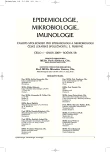Prevalence and Characteristics of Salmonella in Selected Localities of the Czech Republic – Comparison of Epidemiological and Laboratory Data
Authors:
R. Karpíšková; D. Dědičová
Authors‘ workplace:
Státní zdravotní ústav Praha
Published in:
Epidemiol. Mikrobiol. Imunol. 58, 2009, č. 1, s. 31-35
Overview
The study objectives were to characterize in detail human isolates of Salmonella in selected localities of the Czech Republic and to consider the actual epidemiological situation in the country based on the comparison with the reported cases of salmonellosis (source EPIDAT).
Methods:
The source of the national epidemiological data was EPIDAT (communicable disease notification system). Laboratory data was obtained by analysis of Salmonella isolates from five clinical laboratories in Bohemia and Moravia. The isolates were collected at regular intervals from January to August and their numbers were indicative of the local epidemiological situation. The Salmonella strains were serotyped and those of serotypes Enteritidis and Typhimurium were phage typed.
Results:
Epidemiological data analysis confirmed that the predominant causative serotype in the study period was Enteritidis, implicated in 5 329 (89.8 %) of 5 934 reported cases of salmonellosis, followed by Typhimurium (302 cases, i.e. 5.1 %). Laboratory data analysis revealed a lower incidence of the serotype Enteritidis (found in 231, i.e. in 84.6 %, of 273 tested strains) and the same incidence of the serotype S. Typhimurium (14 strains, i.e. 5.1 %). The most common phage types among strains of serotype Enteritidis were PT8, PT4, PT13a and PT6 while phage type DT104 was most often detected among strains of serotype Typhimurium.
Moreover, the study revealed differences between the numbers of reported (EPIDAT) and laboratory diagnosed cases of salmonellosis. Within the study period, 111 (40 %) cases of salmonellosis remained unreported in the study localities.
Conclusion:
The study has shown that the characteristics of Salmonella isolates (serotyping, phage typing and antimicrobial resistance data) relevant to the epidemiological data collection are either inaccurate or unavailable. Therefore, a national system needs to be created for the collection of Salmonella clinical isolates that should be further typed to obtain data for the monitoring at both the national and international levels.
Key words:
salmonellosis, serotypes, phage types, laboratory and epidemiological data.
Sources
1. Anderson, E.S., Ward, L.R., De Saxe, M.J., De Sa, J.H.D. Bacteriophage-typing designations of Salmonella typhimurium. J Hyg 1977, 78, 297-300.
2. EPIDAT 2008, SZÚ Praha, vykázaná data za 1.-34. týden, dosud nepublikováno
3. Gill, N., Reilly, B., Threlfall, J. Annual Report 2005. Surveillance of Enteric Pathogens in Europe and Beyond. EUROPIAN COMMISSION – DG SANCO.
4. Hradecká, H., Koláčková, I., Karpíšková, R., Rychlík, I. Epidemiol Infect 2006, 134, 4, 737-740.
5. NygĆrd, K., de Jong, B., Guerin, P. J., Andersson, Y. et. al. J. Emergence of new Salmonella Enteritidis phage types in Europe? Surveillance of infections in returning travellers. BMC Medicine 2004, 2, 32.
6. Popoff, M.Y. Antigenic formulas of the Salmonella serovars. WHO Collaborating for Reference and Research on Salmonella, Institut Pasteur, 2001.
7. Rodrigue, D.C., Tauxe, R.V., Rowe, B. International increase in Salmonella enteritidis: a new pandemic? Epidemiol Infect 1990, 105, 1, 21-27.
8. Šrámová, H. a Beneš, Č. Salmonelózy v České republice v letech 1989-1993. Epidemiol Mikrobiol Imunol 1994, 43, 47-54.
9. The EFSA Journal. The community summary report on trends and sources of zoonoses, zoonotic agents, antimicrobial resistance and foodborne outbreaks in the European Union in 2006. Italy: 2007. ISBN: 978-92-9199-072-6.
10. Ward, L.R., de Sa J.D.H. and Rowe B. A phage typing scheme for Salmonella enteritidis. Epidemiol Infect 1987, 99, 291-294.
Labels
Hygiene and epidemiology Medical virology Clinical microbiologyArticle was published in
Epidemiology, Microbiology, Immunology

2009 Issue 1
-
All articles in this issue
- Systemic Lupus Erythematosus – A Contemporary View of its Genetic Determination, Immunopathogenesis and Therapy
- Detection of Antibodies to Chlamydophila pneumoniae by Immunoblotting in Patients with Cardiovascular Diseases
- Onychocola canadensis: First Isolates from Onychomycoses in Slovakia
- Molecular Biological and Phenotypical Characterization of Human Isolates of Salmonella Enterica Serovar Paratyphi B dT+ or Salmonella Java
- Prevalence and Characteristics of Salmonella in Selected Localities of the Czech Republic – Comparison of Epidemiological and Laboratory Data
- Comparison of Susceptibility of Spores of Bacillus subtilis and Czech Strains of Clostridium difficile to Disinfectants
- Epidemiology, Microbiology, Immunology
- Journal archive
- Current issue
- About the journal
Most read in this issue
- Systemic Lupus Erythematosus – A Contemporary View of its Genetic Determination, Immunopathogenesis and Therapy
- Prevalence and Characteristics of Salmonella in Selected Localities of the Czech Republic – Comparison of Epidemiological and Laboratory Data
- Comparison of Susceptibility of Spores of Bacillus subtilis and Czech Strains of Clostridium difficile to Disinfectants
- Molecular Biological and Phenotypical Characterization of Human Isolates of Salmonella Enterica Serovar Paratyphi B dT+ or Salmonella Java
